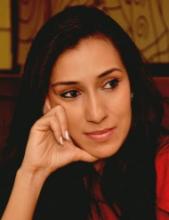University Associate Professor
Interests
Antara Haldar specializes in law and economics, legal theory and law and development – and she is particularly interested in the area lying at the intersection of the three fields. Her work, which is fundamentally interdisciplinary, is defined by its attempt to cut past the dichotomization between the ‘law and economics’ and ‘law and society’ approaches – as well as to bridge the gap between theory and empirics that characterises much of the current development literature. Her work spans the topics of microfinance and other credit markets, land titling and property rights, the relationship between formal and informal law (including the role of trust) and evolutionary institutional dynamics. She is also interested in research methods and epistemology, as well as issues of race and gender.
Research centres and interest groups
CV / Biography
Antara Haldar holds the inaugural position in Empirical Legal Studies at the University of Cambridge, where she is tenured at the Faculty of Law and teaches courses on law, economics and philosophy. She concurrently holds appointments at the Faculty of Philosophy and the Judge Business School, and is a Governing Body Fellow at Peterhouse (Cambridge’s oldest college). She is currently on academic leave from Cambridge, and on a Fellowship at Stanford University. She is also a Faculty Visitor at Harvard University.
She has held various senior roles at Cambridge, including as the Deputy Director of the LLM program, a member of the Faculty Board of the Department of Land Economy for Environment, Law and Economics and on the Management Committee of the Centre for African Studies. She holds degrees in both law and economics, and was educated at Trinity College at the University of Cambridge, Columbia University and St. Stephens College, University of Delhi. She was a Post-doctoral Research Fellow at the prestigious Committee on Global Thought at Columbia University (where she collaborated extensively with Nobel prize-winning economist Joseph Stiglitz), won a competitive Jean Monnet-Global Governance Fellowship at the European University Institute and was an Early Career Fellow at the Centre for Research in the Arts, Social Sciences and Humanities at Cambridge. She is regularly invited to speak and teach around the world, and has been a Visiting Professor at the Faculty of Law at Lund University in Sweden.
She has served as a consultant to the United Nations, been an invited member of the inaugural academic committee of the American Bar Association’s World Justice Project and holds several senior advisory positions including to the Law Society of Scotland and the Indian Congress Party. She has been cited extensively by the World Development Report and the Indian Parliament. Her research appears in top international journals including Politics and Society, Law and Society Review and the International Journal of Law in Context and has been supported by the UK’s Economic and Social Research Council, the European Union, the Government of India and the Law and Society Association.
Her writing has appeared to wide acclaim in major public platforms like The Atlantic, The Times Literary Supplement, The Independent, WIRED and her work has been featured extensively in media outlets ranging from Project Syndicate, NPR, the LA Times, Financial Times and Elle Magazine. She has been the recipient of many top awards including the Indian government’s Jawaharlal Nehru Memorial Trust Award, the Oxford-Princeton Global Leaders Fellowship, the University of Cambridge’s Yorke Prize for legal scholarship that makes a “significant contribution to its field” and the European Commission’s Marie Curie Award for excellence in science.
She convenes The Common Currency Project, an international alliance of some of the world's leading scholars engaged in rethinking economics, and is the PI on a major European Union grant project.



 Facebook
Facebook  X/Twitter
X/Twitter  Instagram
Instagram  YouTube
YouTube  Flickr
Flickr  LinkedIn
LinkedIn